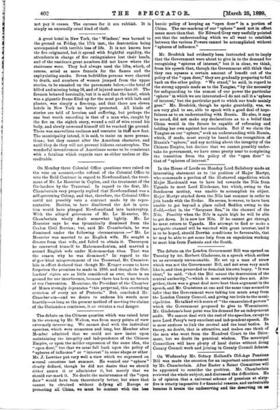On Monday three Colonial Office questions were raised on the
vote on account, —the refusal of the Colonial Office to veto the Reid Contract in regard to Newfoundland, the treat- ment of Mr. Le Mesurier in Ceylon, and the treatment of the Outlanders by the Transvaal. In regard to the first, Mr. Chamberlain very properly replied that Newfoundland was a self-governing Colony, and that, therefore, the Colonial Office could not possibly veto a contract made by its repre- sentative. Besides, to have disallowed the Act in ques- tion would have plunged Newfoundland into bankruptcy. With the alleged grievances of Mr. Le Mesurier, Mr. Chamberlain wisely dealt somewhat lightly. Mr. Le Mesurier says he was tyrannically dismissed from the Ceylon Civil Service; hut, said Mr. Chamberlain, he was dismissed under the following circumstances :—" Mr. Le Mesurier was married to an English wife. He sought a divorce from that wife, and failed to obtain it. Thereupon he converted himself to Ma.hommedanism, and married a second English wife under Mahommedan rites. That was the reason why he was dismissed." In regard to the ol'g.er.•bical misgovernment of the Transvaal, Mr. Chamber- lain in effect declared that though Mr. Kruger seems to have forgotten the promises he made in 1896. and though the Out- landers' rights are as little considered as ever, there is no ground for our interference, because there has been no breach of the Convention. Meantime, the President of the Chamber of Mines strongly deprecates "this perpetual, this overriding criticism of every act of Pretoria." Bat, concluded Mr. Chamberlain—and we desire to endorse his words most heartily—as long as the present method of meeting the claims of the Ontlandeis continues, it co stitutes a real danger.






































 Previous page
Previous page